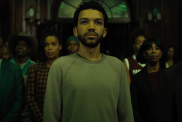One of the more original movies playing at this year’s “New Directors/New Films”–and that’s saying something considering the number of odd offerings on this year’s roster–is Cold Souls, the directorial debut by Sophie Barthes. It stars Paul Giamatti playing a version of himself, an actor trying to start a new theater project but unable to find his way into the head of the character until he sees an ad for a “soul storage facility.” Out of both curiosity and desperation, he looks into having his soul replaced, leading to all sorts of situations–some hilarious, but some very dangerous. The film also stars David Strathairn and Lauren Ambrose as the doctors running the soul-extraction system, and Emily Watson as herself, who just happens to be married to Giamatti in the movie’s reality.
It’s a film that will remind some of other original science-based indie films like Shane Carruth’s underrated Primer, but the one comparison that has been thrown around the most due to the film’s strange and often comical premise is to the work of Charlie Kaufman, particularly Being John Malkovich and Eternal Sunshine of the Spotless Mind, a comparison that the filmmaker was already tired of hearing by the time ComingSoon.net had a chance to talk to her at Sundance earlier this year.
We had only met the delightful Ms. Barthes for a few minutes before she started telling us all about her dreams…
ComingSoon.net: Sundance certainly has had some interesting science fiction movies over the years between this, “Moon” and “Primer.” So did this just come from out of the idea of being able to store souls?
Sophie Barthes: It was a dream. I write my dreams a lot, so I remember them very vividly so in 2005, I had that dream I was in a strange office, an all-white futuristic office in line holding a white box and everyone in line was holding that box and Woody Allen was in line. (laughs)
CS: Had you just watched “Sleeper” recently?
Barthes: I had watched “Sleeper” two days before and I’d seen that movie about… it’s one of my favorite movies. I love Woody Allen, he’s like my idol, but I was in the South of France watching a lot of Woody Allen movies and reading Carl Jung’s “Man in Search of a Soul” so something in my brain did a synaptic connection and so I’m in that line and Woody Allen is there and a secretary comes and says that souls had been extracted and are in those boxes and the doctor will come and assess the troubles of our souls. So Woody Allen’s turn comes, he opens his box, and his soul is a chick pea (laughs) so he’s super-upset and he says he’s made 30 movies, and there’s no way, this is a mistake. So in the dream, I think, “Oh my God, my idol has a chick pea would. What is mine going to look like?” and I reached to open the box and the dream ends. I didn’t see it! But I was so intrigued because it means so many things. This dream is very powerful, so I was like, “Okay, I’m going to write a screenplay out of this,” because it was a very visual funny premise.
CS: But then you expanded on that and created all these rules about what happens with souls during the extraction process and the idea of soul trafficking.
Barthes: Oh, then I invented. Yeah, because that stuff is great, when you have a dream like this, the subconscious is so mysterious so you have this little piece of meaning and then you expand it and then I just went wild. I really wanted to please myself. I like writing when it’s playful and I enjoy it, and the more I was writing, the more fun I was having trying to imagine the rules of that world. What does it mean to rent a soul? I started expanding that story, and I just got those ideas coming in my mind… like can you be completely soulless or do you have to have 5% to be animated. I studied a lot of Greek philosophy–the anima is the soul–so you need as a human to be animated by your soul. There are a lot of play on words with philosophy. I studied a lot of philosophy and philosophers spent 2,000 years trying to define what the human soul is. I read a lot of Descartes and all the French tradition of dualism and I’m more a monist than a dualist. I believe that it’s the holistic integration of the soul and the body, but that’s why Descartes makes me laugh so much. I think the quote at the beginning is supposed to be funny. Not a lot of people read it ironically, but it’s supposed to be ironic when Descartes says, “The soul is a small gland in the middle of the brain.” It’s absurdist when taken out of context. I don’t know. I love being playful with philosophical concepts.
CS: It’s also interesting that we see the lead character played by Paul without a soul… and he doesn’t seem very different, and you start thinking “Then what is a soul?”
Barthes: Yeah… (laughs)
CS: Incidentally, as I watched the movie, I didn’t realize it was made by a woman of European descent. In some ways, it felt like a film that might have been made by an American male filmmaker, maybe because of all the American actors. I wondered how you felt about that.
Barthes: I live in New York and you’re influenced by where you live. I think my soul was shrinking the last eight years, and I think it was my reaction… I arrived in New York at the moment of September 11, so I was feeling that my sensibilities were very affected by the politics and what was going on. I think you’re right, that it’s a reaction. I wanted to write something so surreal, not to think about the reality, and make a satire about the American society. For me, the soul extraction is the next prozac maybe, so we don’t have to feel. People are in denial. This country is going the wrong way. But now, I would feel differently, and I would write something else.
CS: When you were developing the idea, did you have to set some ground rules about what a person would be like without a soul and everything else?
Barthes: I didn’t want to be presumptuous and say I have the answer about what soulfulness and soullessness is because no one knows, it’s very mysterious, but I thought that some characters… you know when you meet some people and you think they’re soulness. They’re not robotic, they’re humans, but maybe they’re not very sensitive or they’re oblivious to people’s feelings. That’s why when they’re in this restaurant, he has this moment where he can’t connect to this woman who’s mother is on life support, and he says, “Why don’t you just unplug her?” He doesn’t know that he’s hurting her. It’s not mean, he doesn’t do it on purpose. He’s just a little numb to human feelings. So we’re trying to define “what is soullessness” and it’s difficult.

CS: At what point did Paul come on board? Had you written the script with him in mind?
Barthes: Yeah, I wrote it with Paul… at the beginning, I was going to write it for Woody Allen, and then I thought he would end up directing the movie.
CS: He doesn’t usually direct other people’s scripts as far as I know.
Barthes: No, no, but I thought it would be really hard to get him. So then I saw “American Splendor” and then I changed the script and wrote it for Paul as Paul Giamati. So when I gave him the script, it was “Paul Giamatti” and when I met him at the Nantucket Film Festival and he loved the idea of the dream, because he writes his dreams and uses his dreams. We connected on that, and then he read the script. I was very nervous because the script was saying “Paul Giamatti” as the character so if he hates it and thinks I’m completely crazy… but he loved it. He really connected to it, so I got lucky.
CS: He definitely seems to like movies where he plays characters similar to himself or where he can make fun of previous characters he’s played.
Barthes: Yeah, yeah. He’s super-humble and modest about his career. He doesn’t take himself seriously, so he’s up for anything. He has a total sense of self-derision, which for me, is a great proof of intelligence, someone who makes fun of himself and doesn’t care about his image. You can ask him to do anything and he does it. He’s just super-easy.
CS: I think moviegoers are able to connect to him because he’s a little more of an everyman. No one’s going to see a Brad Pitt movie and say, “Oh, I’m just like that.”
Barthes: No, not at all.
CS: When he got the script, did he try to improvise or add things to the script to make it more like himself?
Barthes: No. On the contrary, he wanted it to be less like himself. (Laughs) I had a version of the script that I wanted to incorporate real specifics of his previous movies, “Sideways” and “American Splendor,” and he wanted me to create a persona that was a fantasy of Paul Giamatti but not too close to him, because it gets very uncomfortable. But he was super-open, and at the same time, he was like, “Try not to make it too much like myself.” But I don’t know him, so I was just imaging things.
CS: So he’d say, “Okay, this is a little close for comfort; can we change that?”
Barthes: Yeah, a little bit, him and his wife, Elizabeth Giamatti. I had given them one kid and they have a kid the same age I had put in the same screenplay. To preserve their privacy and their private life, I had to withdraw some elements. It’s not him or who he is. (chuckles)
CS: A lot of people might see this and think he’s married to Emily Watson.
Barthes: A journalist asked him! “Are you married to Emily Watson?” (laughs) and Paul was like, “No, this is fiction!”
CS: I’ve met him a few times and he is playing a character who is very much like him in real life. Whose idea was it to have him married to her? Was that something in the script as well?
Barthes: The wife, I didn’t know who I was going to get, but I love Emily Watson, and she’s a little bit underused in the movie now. I wish the character had a bigger role, because she’s such an amazing actress. There’s so many plots and things happening in the movie that I couldn’t develop the wife too much, but I was so happy when Emily Watson said “yes” because she was my top choice.
CS: David Strathairn is in this, too, and it’s very different than other things we’ve seen him do in some ways, because he doesn’t do a lot of comedy.
Barthes: I think David was a bit nervous at the beginning, because he hasn’t really done comedies, but Paul and him were in a Chekov play together, so they had a chemistry. They were used to working together so it helped them and David is a super-fantastic actor and a very nice guy.
CS: How did you find the Russian actress Dina Korzun?
Barthes: Actually, I found her through Sundance. I saw “40 Shades of Blue” and she was the actress and I was completely obsessed with her. I thought she was so good, and I’d seen “The Last Resort,” the Pawel Pawlikowski, it’s a movie that was shot maybe three or four years before that, and she’s incredible in it. She plays a Russian mom who is caught in a no man’s land in the UK, because she doesn’t have a visa, so they put her in this strange center. She’s very powerful, so when I saw her, I wanted her. I went to London and I talked to her and she liked the script and said “yes.”
CS: What about the rest of the Russian actors in that part of the movie?
Barthes: Russian actors, we did casting in Russia. Our casting director in New York found Sveta, Katheryn Winnick, she’s Canadian but from Ukrainian origins, but all the other actors we did casting. In Moscow, we found Dmitri. He comes from the same theater company as Dina, the Moscow Art Theater, which is this very prestigious theater, and all the rest were theater actors in St. Petersburg. I wanted to have real Russians or otherwise, it feels fake. And Dmitri is like the Martha Stewart of Russia; he has his own cooking show and he’s an opera singer, he’s bigger than life this guy.

CS: How did you go about designing the visuals of the movies? I understand you actually went to some of the places and took photos?
Barthes: Yeah, I had a book of pictures that I put together to show the producers. I live with Andrij Parekh, who’s the DP, so we had all those pictures from Deborah Turberville, Francis Bacon, Bill Hanson, all photographers that we loved. We created that universe visually, and now that I look back at the movie, the pictures are very close, the colors, the mood. We also spent a lot of time, we’d go to the MET and we pointed at the palette of colors that we liked. For me, the aesthetics is very important in the movie. A lot of movies, if they don’t have locations that are interesting, I’m not really engaged. I think maybe now people don’t care that much about locations, but there is a Golden Age in the ’60s I think where French and Italian cinema and architecture were very close together, Fellini or Bertolucci.
CS: Right, those filmmakers were all about the locations.
Barthes: Yeah, and I believe that cinema should be doing that. That you really should have aesthetic pleasure from what you see and not just shooting in diners.
CS: So before you started filming, you went to St. Petersburg and had already been to some of the places where you filmed?
Barthes: Yeah, we shot for ten days in St. Petersburg. We went a year ago and we went on location scouts to all the hotels in St. Petersburg and then we found that hotel and fell in love. We stayed in that hotel to feel the mood. (laughs) Locations for me are really the soul of the movie. It’s a very sensual piece and we had a fantastic location manager, Jeff Brown. He got the script and he found those amazing locations.
CS: What about designing the soul-extracting machines? It really seems like it could be a working piece of technology. Did you work with equipment designers on that?
Barthes: I was at the Sundance Lab–the Directors and Writers’ Lab–with a fellow filmmaker, Eric Lahe, who is also an artist, a sculptor and a painter, and he loved the script and he started sketching machines. And I was like, “Why don’t you do it?” so when we started pre-production of the movie, he built this machine in the garage with his brother. It’s made of wood and foam and they built it themselves in 46 days, and then they put the machine on a truck and they crossed from Oregon to New York. (laughs) They had it in pieces and they built it in New York, but the brakes of the truck failed two hours from New York and they’re stuck in this motel with the soul-extractor machine (laughs)… it was insane! I was so happy when I saw the machine. I hadn’t seen any picture, nothing, so I didn’t know what he was bringing. This was like three days before shooting that scene, so we were a little bit nervous, but then when the machine was put together, I was like, “I love it, it’s like a giant vagina marshmallow thing!”
CS: It looks like something you might see in a doctor’s office, like an MRI. Now I have to ask a question that I’m sure you’re getting asked a lot, about the Charlie Kaufman comparison. Do you consider those comparisons flattering or do you think they’re at all valid?
Barthes: I have two reactions. I think it’s flattering, but I think it’s getting really annoying. Flattering because I think he’s a genius. I really have so much admiration for his writing, but then it’s a little bit inaccurate because he only directed his last movie. Spike Jonze directed “Being John Malkovich,” Michel Gondry directed “Eternal Sunshine” and I’m directing my own script, so it’s a different visual. I think the mood is very different, and the one thing that upsets me a little bit is that I didn’t get this in France or other countries. In the U.S., there is this tendency to categorize, I think, and they only know Charlie Kaufman as a surrealist, but France had surrealism since the ’20, and there’s Buñuel – that’s a much stronger influence on me than Kaufman for sure. I’ve seen Kaufman movies, but they don’t know about those movies here. You talk about Dali and all the surrealism movements that are so dear to me, and also the Theater of the Absurd like Alfred Jarry. Indiewire talked about it actually; I was really pleased that they explained why it’s not a Charlie Kaufman movie. Like Samuel Beckett, Jean Tardieu, all the Theater of the Absurd has been a huge influence on me. I grew up reading that… and Gogol is the most surrealist, funny Russian writer you can imagine. If you expand your vision, surrealism is a very important movement that was essential in literature, music, painting, poetry…
CS: And it probably influenced Charlie Kaufman, too.
Barthes: Yeah! I’m sure he’d been influenced by it. The one thing that upsets me is that today, if Buñuel would make “Discreet Charm of the Bourgeoisie” and it would be at Sundance, everyone would say, “Oh, it’s like Charlie Kaufman.” And it’s like, okay, I spent three years of my life doing this movie, and if it’s just a derivative thing than I wouldn’t have done it, because then it’s immoral.
CS: I don’t think anyone would say it’s derivative because it’s a completely original idea, but it just enters surrealist territory that he’s entered before, and you don’t see other filmmakers making movies where actors playing a heightened version of themselves and having strange premises that are believable.
Barthes: Yeah, yeah, exactly. The last thing I want to say is that in terms of budget, there’s no comparison. Those are much bigger movies and we struggled with a very small movie, so when they’re like “Oh, it’s not as well-executed,” it’s like, “Okay, I’m struggling with a very small independent film because I don’t have the budget of Charlie Kaufman.”
(Incidentally, Barthes spoke out about this at one of the Sundance screenings, which you can watch here.)
CS: Do you have any idea what you might do next now that you’ve finished this?
Barthes: Yeah, I have two ideas. One that is very dream-like, but it’s bigger in terms of budget, science fiction also, and another one that takes place in the ’60s and it deals with psycho-analysis, but I don’t talk too much about ideas because the moment you talk about them, you’re diluting them.
Cold Souls will play as part of Lincoln Center and MOMA’s New Directors/New Films ’09 on Friday, March 27, and Sunday, March 29. Tickets may still be available at FilmLinc.com.









